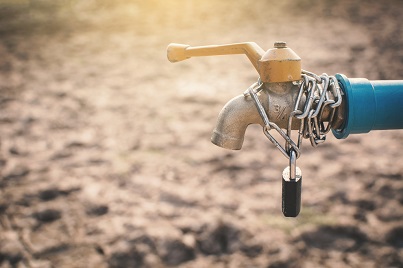Water Scarcity: Making Every Drop Matter
29 Mar 2019
“Leave no one behind.” This was the message the World Water Day championed this year. The plea to leave no one behind – a basic tenet of the United Nations Sustainable Development Goals (UN SDGs) - is a powerful call for universal inclusiveness. It envisages a world where the water-stressed areas of today do not face the same challenges in the future. Water is a precious resource for every nation, but it is particularly incumbent upon the water-scarce regions to proactively work towards sustainable and innovative ways that ensure access to safe and clean water for all.
The most water-scarce region in the world is the Middle East and North Africa (MENA) where more than 60% of the population has little or no access to drinkable water. Over 70% of the region’s Gross Domestic Product (GDP) is exposed to high or very high-water stress, which is extreme compared to the global average of 22%. According to the World Bank, the MENA region also has the greatest expected economic losses from climate-related water scarcity, estimated at 6–14% of GDP by 2050. This scarcity poses a significant threat to the region’s long-term socio-economic development.
As gloomy as this situation might appear, there is always a hidden opportunity in adversity. The region is heavily dependent on the desalination of water; so much so, that it accounts for nearly half the world's desalination capacity making it the largest desalination market globally. Being an energy-intensive process, desalination of water has a large carbon footprint, which contributes to climate change and its linkages to water stress. It is also an expensive process which means that it can not be easily replicated in all countries.
The opportunity to turn this adversity on its head lies in the recycling of grey water (drained from air conditioners (AC), showers, washing machines, etc). Due to the hot and humid climate in the MENA region, there is a naturally high usage of air conditioning. The AC condensation created, which usually drains off directly to sewage, can be collected and repurposed for a variety of uses such as cleaning, irrigation, flushing toilets and more.
It is interesting to note here that AC condensate is not only naturally-generated but also free of cost. Most of the time, this water is clear, odourless, free of mineral and disinfectants. While it contains dust and a certain level of bacteria, it can be easily treated for various purposes, except for drinking. This grey water offers an immense opportunity to reduce the municipal water supply for cooling towers in shopping malls, factories, hospitals, etc. In a typical household globally, it is estimated that 50-80% of wastewater generated is grey water. Imagine the large-scale savings that would be generated if we started collecting and recycling this water. To put things in perspective, the daily usage of water in Dubai stands at 550 litres, the equivalent of seven average sized bathtubs. If we saved 30% of clean water by using grey water, we would reduce the dependence on clean water to 385 litres, saving more than two bathtubs of water per person each day.
When as many as 13 out of 22 Arab countries lie in the category of severe water scarcity at less than 500 m3 water per inhabitant, compared to world average of 6,000 m3, the time has come to aggressively explore sustainable alternatives to our water needs. We owe it to our children and future generations. It is not just about water as a critical resource. Something much deeper is at stake. Access to water has been a sensitive issue across the MENA region. It has been one of the factors in numerous conflicts in the region. If we are to mitigate the conflict and vulnerabilities arising out of water scarcity, we need to move beyond tokenism. The foundation of a sustainable future lies in peace, cooperation, and inclusiveness. Unless we devise multiple innovative, sustainable, and scalable solutions to the water problem, we cannot have a future wherein no one is left behind, as envisioned through the SDGs.
Let’s pledge to contribute to this endeavour in whichever way we can to secure a better future for our MENA region. If you are a business, you can support innovation in water technology and collaborate with like-minded organisations to make innovative solutions scalable and financially viable. Think tanks could forge international alliances to collaborate on research as well as create a groundswell of support and global awareness. If you are an individual, you can start by repurposing grey water from your cooling system for other uses such as watering your plants or washing your floors. Remember, every drop matters and our collective effort is aimed at making each drop count. Inaction on this front will be detrimental and the victims will be humanity and mother earth. On average, around 60% of the human body is water. It is time we save ourselves.
X





